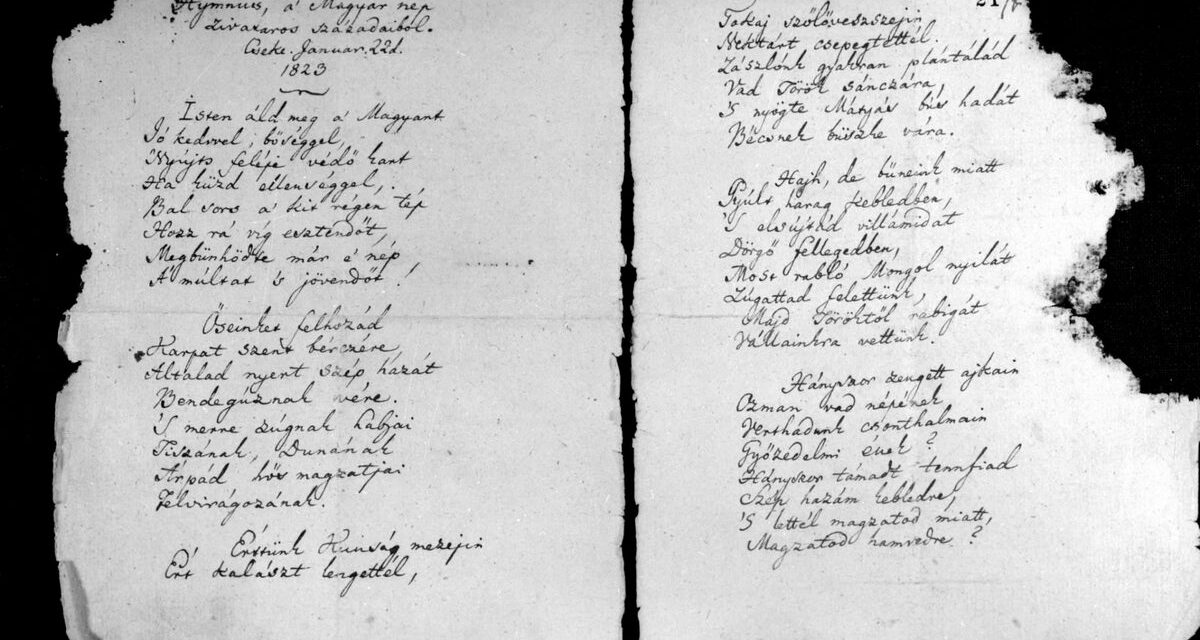A heart-felt prayer, a common plea of a people: God, bless the Hungarians... The Anthem, Ferenc Kölcsey's poem, was written 201 years ago, since then it beats the hearts of every child of our people, warms their souls, and with its lines we pray to the Creator as one people, to bless the Hungarians.
the basic law of our country, which will enter into force on January 1, 2012, begins with these words: "God, bless the Hungarians!"
January 22 became the day of Hungarian culture because Ferenc Kölcsey finished writing his ode Hymnus from the Thunderous Ages of the Hungarian People 201 years ago in 1823 in Szatmárcsek, which the country recognized after the Károly Kisfaludy, who defined the literary life of the period in Pest, published it in 1829 in the literary journal Auróra, which he edited.
Despite the fact that Hungarian people took Kölcsey's poem to their hearts from the first moment, and Ferenc Erkel set it to beautiful music in 1844, it did not immediately become our national prayer. Not only because something similar already existed at that time. Today, we would rather call it a national anthem than a national anthem, in any case, it is a fact that from the 16th century onwards, this role was played among Catholics by the hymn Our Lady Our Lady, which begins as follows:
"Our Blessed Mother, our great heavenly patron! // Being in great need, this is how our country addresses us: // About Hungary, our sweet country, // Don't forget the poor Hungarians!"
The Reformed, on the other hand, chose the 90th psalm, which tradition holds to have been sung by István Bocskai's men from Hajdú when they went into battle.
During Kölcsey's time, the orchestra played the imperial anthem at official state events, the music of which was composed by Joseph Haydn, who lived in Eszterháza for three decades, using Croatian folk song motifs from western Hungary. The text was completed in 1791 and greeted Emperor Franz, then Ferdinand and Franz Joseph, who took turns on the throne, which meant that it was modified in accordance with the name of the current monarch. In Vienna, at the court chancellery, this was resolved by the introduction of a new text in 1854, i.e. only a few years after the suppression of the Hungarian desire for freedom. However, the Gott erhalte that was finalized in this way received a text that was not at all pleasing to the Hungarian ear: "Keep God, protect God // Our king sa közhazát! // Finding strength in the holy faith // Share the sage's word of command! // Let us protect her ancient crown // May she be punished wherever she goes! // The Hungarian homeland and the Habsburg throne // It was united by a heavenly hand”.
This was the official anthem of the Austro-Hungarian Monarchy. However, Hungarians did not like him. Not only because it was regularly played by the military band at the execution of the martyrs of our freedom struggle, right after the murders.
At the same time, there was the other one, ours, written by Kölcsey with a Hungarian heart, Ferenc Ferenc embedded in music with a Hungarian soul, and the synthesis of these two was presented to the general public on July 2, 1844 at the National Theater in Pest. From this moment on
it became the national anthem of the Hungarians, even if it could only become so in the heart, since the official state position still insisted on Gott erhalte.
It is true that on the occasion of the negotiations leading to the settlement, on December 14, 1865, Ferenc József entered the Budapest parliament to the sounds of the National Anthem, not the Gott erhalt, to open the parliament, but it was only a gesture on his part.
When Alfréd Hajós won the first Hungarian Olympic title at the first modern Olympic Games in Athens in 1896, the imperial anthem was played for the first time at the medal ceremony. The members of the Hungarian delegation immediately waved off the band and asked to play Kölcsey's poem and Erkel's music in honor of the Hungarian champion. This hasn't changed since then, anyway
since then, the world has been able to listen to the National Anthem being played for our athletes at the Olympics 184 times.
The National Anthem therefore became a symbol of national resistance and the desire for freedom during the Monarchy. A good example of all this is that when Ferenc József visited Pécs in March 1903, and the orchestra played the Gott erhalte according to protocol, the audience began to sing the Anthem at the top of their lungs, and their voices drowned out the military band playing the imperial anthem. A month later, in parliament, László Rátkay presented a bill on "the unified Hungarian national anthem", including Kölcsey's poem and Erkel's sheet music. The Parliament immediately sided with the initiative and accepted the text, but Ferenc József did not sanction it, so it did not become law.
For the first time at an official state event, the last Hungarian king, IV. The National Anthem was played during the coronation of Károly, who marched into the Mátyás Church to this tune.
As for Gott erhalte: as our national anthem, the band played it for the last time in Hungary on October 23, 1918, at the opening of the University of Debrecen. In honor of Károly, who lost his throne and empire a few days later, and the Hungarians soon after lost 71 percent of their homeland. However, the National Anthem was not rehabilitated even during the Soviet Republic, Lenin's Hungarian followers with the red flag sang the Internationale. However, Gott erhalte survived the Monarchy in a sense, since Haydn's music is the music of today's German national anthem.
However, in the independent Hungary torn apart by Trianon, no one hesitated, the National Anthem became the national prayer.
The entire article can be read at hirado.hu
Cover photo: The original manuscript of the Anthem in the National Széchényi Library in 1982 (Photo: MTI/Csaba Ráfael)













